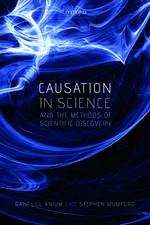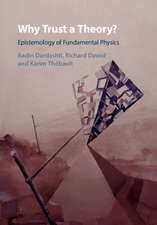The Scientific Attitude, Second Edition: The Conduct of Science Series
Autor Frederick Grinnellen Limba Engleză Paperback – 8 iun 1992
THE SCIENTIFIC ATTITUDE presents a systematic account of the cognitive and social features of science. Written by an experimental biologist actively engaged in research, the work is unique in its attempt to understand science in terms of day-to-day practice. The book goes beyond the traditional description of science that focuses on method and logic to characterize the scientific attitude as a way of looking at the world.
Professor Grinnell uses examples from biomedical research to describe science at three interdependent levels. At the first level, the individual scientist makes observations, formulates hypotheses, and does experiments. The scientist's thought style determines what can be seen and what it will appear to mean. At the second level, scientists participate in social institutions such as graduate programs, research groups, journal editorial boards, and grant review panels. Each of these institutions tries to promote its own distinctive collective thought style. Finally, at the third level, scientists participate in the world of everyday life beyond science, a world that continuously influences and is influenced by the activities and discoveries of science.
Professor Grinnell uses examples from biomedical research to describe science at three interdependent levels. At the first level, the individual scientist makes observations, formulates hypotheses, and does experiments. The scientist's thought style determines what can be seen and what it will appear to mean. At the second level, scientists participate in social institutions such as graduate programs, research groups, journal editorial boards, and grant review panels. Each of these institutions tries to promote its own distinctive collective thought style. Finally, at the third level, scientists participate in the world of everyday life beyond science, a world that continuously influences and is influenced by the activities and discoveries of science.
Preț: 244.40 lei
Nou
Puncte Express: 367
Preț estimativ în valută:
46.77€ • 50.01$ • 38.99£
46.77€ • 50.01$ • 38.99£
Carte tipărită la comandă
Livrare economică 17 aprilie-01 mai
Preluare comenzi: 021 569.72.76
Specificații
ISBN-13: 9780898620184
ISBN-10: 089862018X
Pagini: 179
Dimensiuni: 152 x 229 x 13 mm
Greutate: 0.31 kg
Ediția:Revised.
Editura: Guilford Publications
Colecția Guilford Press
Seria The Conduct of Science Series
ISBN-10: 089862018X
Pagini: 179
Dimensiuni: 152 x 229 x 13 mm
Greutate: 0.31 kg
Ediția:Revised.
Editura: Guilford Publications
Colecția Guilford Press
Seria The Conduct of Science Series
Public țintă
Postgraduate, Professional, Professional Practice & Development, and UndergraduateCuprins
1. INTRODUCTION.
2. MAKING OBSERVATIONS. Observing Cells. Analyzing the Cell
Concept. Learning to See Cells. The Cell Gestalt. The
Concept of Life. The Impartiality of Science.
3. EXPERIMENTAL DESIGN AND INTERPRETATION. Choosing Problems
for Study. Hypotheses and Expectations. The Assumption of
Reproducibility. Seeing Data According to Different
Gestalts. Luck in Science. Explicit and Implicit
Hypotheses. Development of Hypotheses. Structure, Function,
and Organization in Biology.
4. SCIENTIFIC COLLECTIVES: TRANSMISSION OF THE THOUGHT STYLE.
Thought Collectives and Intersubjectivity. Acceptance of
New Discoveries by the Thought Collective. Structure of
Graduate Programs. The Reputation of Graduate Programs.
Graduate Courses and Exams. Thesis Advisors. Structure of
Individual Laboratories. Expanding the Laboratory Thought
Style. The Ph.D. Thesis.
5. SCIENTIFIC COLLECTIVES: MAINTAINING THE THOUGHT STYLE.
Evaluating Prospective Faculty Members. Research Papers.
Research Papers Other Than Formal Papers. Research Funding.
Setting the Agenda for Future Research. The Scientific
Establishment.
6. SCIENTIFIC MISCONDUCT: SCIENCE AT RISK. The Meaning of
Scientific Misconduct. Biological Activity of an Infinitely
Diluted Solution: A Study in Controversy. Error vs.
Fraud--Part I: The Baltimore Case. Error vs. Fraud--
Part II: Why Are They Linked Together? Auditing the
Scientific Literature. The Integrity of Science. Secrecy
and Sharing Research Data and Materials. Conflict of
Interest.
7. SCIENCE AND THE WORLD. The Origins of Science in Everyday
Life Experience. Life Experience Beyond Science. Science
and Religion. Science and Ethics. Scientists as People. The
Influence of Politics on Science.
8. CONCLUDING COMMENTS.
2. MAKING OBSERVATIONS. Observing Cells. Analyzing the Cell
Concept. Learning to See Cells. The Cell Gestalt. The
Concept of Life. The Impartiality of Science.
3. EXPERIMENTAL DESIGN AND INTERPRETATION. Choosing Problems
for Study. Hypotheses and Expectations. The Assumption of
Reproducibility. Seeing Data According to Different
Gestalts. Luck in Science. Explicit and Implicit
Hypotheses. Development of Hypotheses. Structure, Function,
and Organization in Biology.
4. SCIENTIFIC COLLECTIVES: TRANSMISSION OF THE THOUGHT STYLE.
Thought Collectives and Intersubjectivity. Acceptance of
New Discoveries by the Thought Collective. Structure of
Graduate Programs. The Reputation of Graduate Programs.
Graduate Courses and Exams. Thesis Advisors. Structure of
Individual Laboratories. Expanding the Laboratory Thought
Style. The Ph.D. Thesis.
5. SCIENTIFIC COLLECTIVES: MAINTAINING THE THOUGHT STYLE.
Evaluating Prospective Faculty Members. Research Papers.
Research Papers Other Than Formal Papers. Research Funding.
Setting the Agenda for Future Research. The Scientific
Establishment.
6. SCIENTIFIC MISCONDUCT: SCIENCE AT RISK. The Meaning of
Scientific Misconduct. Biological Activity of an Infinitely
Diluted Solution: A Study in Controversy. Error vs.
Fraud--Part I: The Baltimore Case. Error vs. Fraud--
Part II: Why Are They Linked Together? Auditing the
Scientific Literature. The Integrity of Science. Secrecy
and Sharing Research Data and Materials. Conflict of
Interest.
7. SCIENCE AND THE WORLD. The Origins of Science in Everyday
Life Experience. Life Experience Beyond Science. Science
and Religion. Science and Ethics. Scientists as People. The
Influence of Politics on Science.
8. CONCLUDING COMMENTS.
Notă biografică
Frederick Grinnell, PhD, The University of Texas at Dallas.
Recenzii
The Scientific Attitude presents a clear picture of what scientists actually do. The book offers a succinct statement of the issues and is pitched at the right level for the beginning graduate student. --Tumuo Hoshiko, Department of Physiology and Biophysics, School of Medicine, Case Western Reserve University
For Frederick Grinnell, science is not a spectator sport. He is an active research scientist who has taken the time to stand back and look at how scientific investigations, including his own, are actually conducted. The result is The Scientific Attitude, a book that every student thinking of becoming a scientist should read....I wish that Grinnell's book had been available to me when I was contemplating a career in science.'' --David L. Hull, Northwestern University
-For Frederick Grinnell, science is not a spectator sport. He is an active research scientist who has taken the time to stand back and look at how scientific investigations, including his own, are actually conducted. The result is The Scientific Attitude, a book that every student thinking of becoming a scientist should read....I wish that Grinnell's book had been available to me when I was contemplating a career in science.'' --David L. Hull, Northwestern University
This is a well-written, well-referenced, accessible account of what science is and what it is not. All the important nuts and bolts' are considered, including how science is done, how ideas are transmitted through time and among individual investigators, and how the enterprise is affected by nonscientific influences....That I enjoyed this book as much as I did is evidence that Grinnell has succeeded in his aim to make his views clear to anyone interested in science. I highly recommend this book to all who would like a working understanding of scientific practice. I also endorse its use by those interested in the study of complex human systems.
--The Journal of Medical Humanities, 3/8/1992























